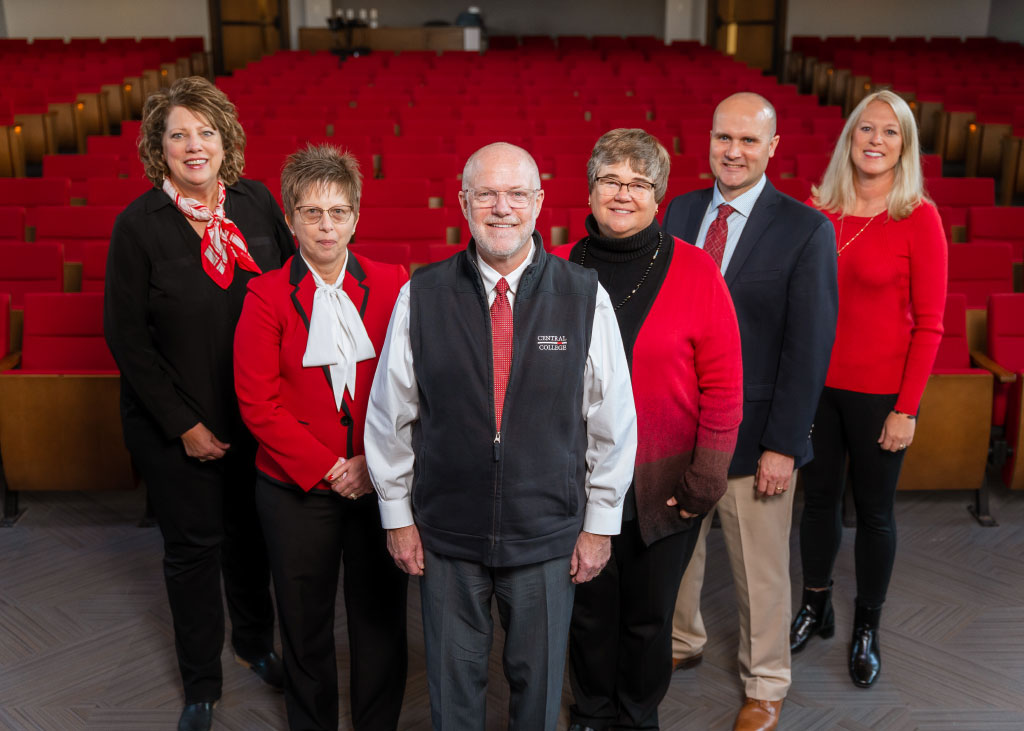
Central College President and Senior Leadership Team. Left to right: Carol Williamson, vice president for student development and dean of students, Karen Tumlinson, vice president for finance and administration/treasurer, Mark Putnam, president, Mary E.M. Strey, vice president for academic affairs/dean of faculty, Chevy Freiburger, vice president for enrollment management and dean of admission and Sunny Gonzales Eighmy ’99, vice president for advancement.
Some years ago, I was enjoying a conversation with a colleague who devoted his career to writing. His professional journey included side trips into journalism and corporate communications. I asked him, “What do you love about writing?” He responded that while writing is always a chore, it is the best way he can channel his insatiable curiosity.
As I pondered his thoughts, it occurred to me that curiosity and writing are a good pairing. One explores and the other expresses. More importantly, these two activities are the fundamental components of learning. We are challenged by the unfamiliarity of new subject matter, awkward attempts at performing new skills and the discomfort of new experiences. One definition of learning might be: the exploring and expression of curiosity.
Complacency is the enemy of curiosity. When we accept the existing boundaries of thought, we retreat from the edges of self-discovery and awareness of all that surrounds us. Complacency is fed by risk aversion. Inertia is high in this context as the pressures of time and the limits of resources reinforce a pattern of repetition. Sameness overtakes curiosity because it is simply easier to be swept up in the routines of thought and practice. We read the same things, talk to the same people and go to the same places.
Nurturing curiosity is a choice — one we must make every day through the course of life if we are to remain curious. It begins with challenging the underlying assumptions.
We assume so much in our recurring experiences. Life is less complicated if we accept what has always been so — at least in our thinking. Foreclosure to new ideas is where learning stops. Rigid adherence to accepted norms in the absence of interrogation yields mundane thinking. It’s a trap. Validating our ideas and testing our skills is a worthy endeavor. It is liberating to affirm our knowledge and capacities.
Learning that is born of curiosity often involves others. Community is the relational framework we can rely on to explore. Communities of learning and practice are a rich source of discovery. Herein we share our ideas, hear about the ideas of others and try something new. While we can feel vulnerable as a novice dwelling in the presence of others, particularly those more experienced, a healthy community encourages our curiosity. At its best, community is a place we can feel socially safe as a learner.
Embracing our curiosity involves a willingness to wander. One thing naturally leads to another. Even the things that allude our continuing interest add value as all learning is connected by the broad patterns of human experience. Freeing our curiosity is never a waste of time. Everything belongs to our learning.
An ambition for lifelong learning embraces curiosity, engages in community and explores widely. This is what opens doors for a lifetime.












To encourage serious, intellectual discourse on Civitas, please include your first and last name when commenting. Anonymous comments will be removed.
Comments are closed.